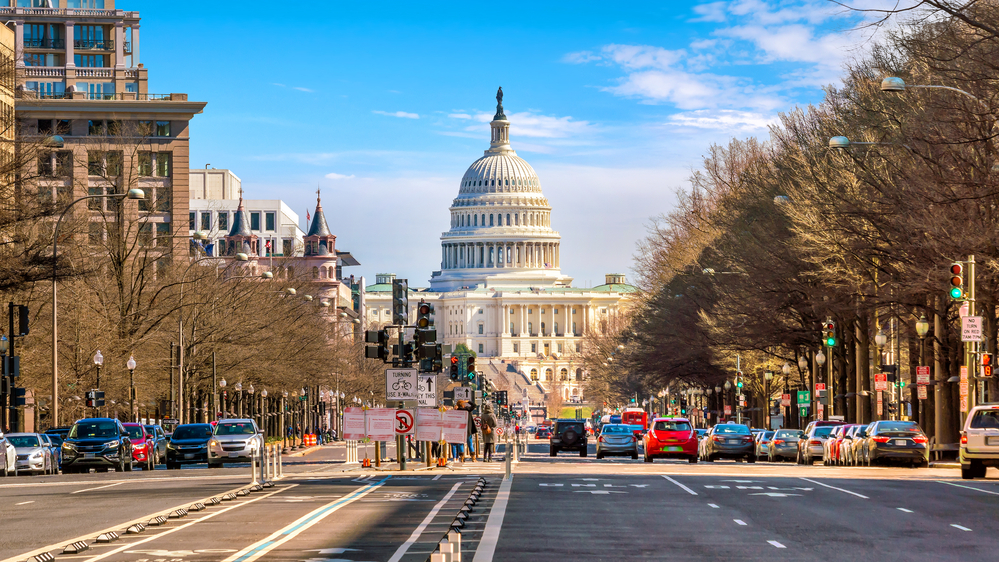Compare D.C. Electric Prices

Washington DC Electricity Rates
Anyone living in Washington DC has access to numerous resources to address the issue of high energy bills. By simply clicking on Electricrate.com, you will be able to find the information on all energy plans offered in your ZIP code area. Contract length, and pricing. After you enter your ZIP code, you will get a list with live energy rates that may be perfect for the energy needs of your new home.
Even if you live in the Washington DC area already, you can benefit from switching to a new supplier to keep your office, home, or other business space well-light. With an option for every citizen, there may be, the plans are varied and so are additional products. Freebies, additional rights, your own online account, and many more are just some of the options offered to you, as a new customer. Here are some of the most popular Washington DC energy plans and electricity rates:
| Energy Provider | Plan Length | Electric Rate |
|---|---|---|
| Constellation | 36 Months | $0.122 per kWh |
| Major Energy | 12 Months | $0.128 per kWh |
| Direct Energy | 18 Months | $0.132 per kWh |
| Direct Energy | 12 Months | $0.134 per kWh |
| ClearView Energy | 12 Months | $0.139 per kWh |
Washington DC Electricity Providers
PEPCO continues to deliver power and the monthly electric bill to customers in the DC area even after they choose a competitive supplier. If they do not choose a supplier, they pay a default rate known as the Price to Compare.
More Choices Equals Lower Prices
If competitive rates are below the PEPCO DC Price to Compare, then customers will save money on their PEPCO DC electric bill. Find low rates being offered in the PEPCO DC service area below.
Washington DC Energy Market Overview
Washington DC or the District of Columbia has had energy freedom since 2001 when the Public Service Commission of the District of Columbia created a competitive marketplace for electricity and natural gas rates. At the moment, only customers served by the state power company PEPCO are able to shop around, compare electric rates in Washington DC and select an alternative energy provider.
Those who switch will continue to have their energy delivered and power outages fixed by PEPCO. However, as far as the prices for electric rates, you can have your say.
Energy Deregulation in Washington DC
Washington DC deregulated its energy market in two waves – in 1999, and in 2001. The first step meant that natural gas was deregulated, while the second one encompassed electricity deregulation. This was done in order to help reduce energy costs for an average consumer and to ensure fair pricing. In part, this was done because the DC produces very little energy of its own and relies heavily on imports. In fact, Washington DC’s energy demand is over 80 times higher than its power supply.
Utility Companies in Washington DC

Only the customers serviced by the utility company PEPCO are able to switch electric suppliers. PEPCO supplies energy to approximately 883,000 customers in the District of Columbia and Maryland. Currently, PEPCO’s electric power Price to Compare is set at 8.44 cents per kilowatt-hour.
To contact the PEPCO customer service number, you can dial 1-877-737-2662.
Electric Utility Companies vs. Energy Providers
Utilities and energy providers are two different types of companies. Utilities maintain the hardware that powers your home, such as power lines that connect to your home, transformers, electrical breakers, and meters. They’re also responsible for repairing damage to this infrastructure, such as from storms, windstorms, or tree branches. Utility companies make sure there’s enough capacity to meet the demand for electricity, both in the short and long term. These services are paid for by the delivery fees on your electricity bill.
Your power provider delivers energy to your home through the grid. This is the company you have an electric contract with and pay for electricity. If you go with renewable electricity and solar panels, the company installing your net-metering meter will give you a bill credit for excess energy sent to the grid.
Washington DC Energy Plans
There are several types of energy plans that you can purchase in Washington DC. This way, you can always make the choice of the plan that works for you and for your energy needs. These are the types of plans offered in Washington DC:
- Fixed-rate plans,
- Variable-rate plans,
- Renewable energy plans,
- Prepaid energy plans,
- Time-of-use energy plans,
- Solar plans,
- Average-billing plans,
- Pay-as-you-go energy plans,
- No deposit plans, and
- Commercial or business energy plans.
Fixed-Rate Plans
The biggest advantage of fixed-rate energy plans is that your electricity rates will not change for the duration of your plan. This can provide peace of mind for customers who are on a budget or who live in areas where weather events, such as storms, could disrupt the energy supply. These plans can be signed for a long term, but beware that a 5-year contract may not be a better option than a three-year one. This is our recommended type of energy plan, as you are protected against energy price fluctuations.
Variable-Rate Plans
We advise our customers against getting variable rate plans because the electricity rates can fluctuate on a monthly and even day-by-day basis. The baseline electricity rate you pay with variable-rate energy plans is usually somewhat lower than with fixed-rate plans, but you don’t have the same level of protection against energy prices that are too high.
With a variable-rate plan, you will be able to save some money on your energy bill during the spring and the autumn. In general, this is when the energy demand is the lowest. However, your energy prices will skyrocket during winter and summer, when energy demand is high and the supply is relatively low. However, this may be a good option, especially for those who have very energy efficient homes or have another source of heat, such as firewood or pellets.
Renewable Energy Plans
There are a variety of electricity plans available in Washington DC, many of which include renewable energy options. These green energy plans allow you to power your home with clean energy while also getting low electricity prices and protecting the environment. Green energy plans typically come with a premium attached. This means that green electricity prices may be slightly higher than conventional energy prices. Thanks for considering a green energy plan!
Prepaid Energy Plans
Prepaid energy plans have become increasingly popular in recent years due to their flexibility and convenience. With a prepaid plan, you pay for your expected energy usage for the month ahead of time. This allows you to better budget your expenses and avoid any unexpected costs. Thanks to prepaid energy, you can say goodbye to minimum contract durations and other inconvenient restrictions.
Time of Use Plans
Time of Use energy plans can help you save money on your electric bill by providing cheaper rates during certain times of the day. These plans typically include both high and low electricity rates, so you can take advantage of the cheaper periods to power your home. In some areas, Time of Use plans also offer free electricity during certain times of the day. By focusing your expenditure on these periods, you can maximize your savings. Additionally, using the delayed start feature on some of your appliances can help reduce your overall electricity usage.
Solar Plans
If you’re looking for a solar energy plan, Washington DC has a few options that you might be interested in. These plans are designed to allow you to send extra power back onto the grid, which can help offset your energy costs. To see if there’s a solar plan available in your area, just head over to your local utility website and enter your ZIP code. From there, you’ll be able to find a variety of electricity plans and see if any of them offer bill credits that can help offset the cost of powering your home at night or during the winter months. Thanks for choosing solar!
Average Billing
Average Billing is a great way to keep your electricity costs fixed. Your monthly bill is calculated based on your annual usage, so it evens out the higher usage in summer and lower usage in winter. If you’ve used more electricity than you’ve paid for, you’ll just pay the difference. And if you’ve paid more than you’ve used, you’ll get a refund, energy credits, or a lower monthly bill in the upcoming year. So it’s a win-win!
Pay-as-You-Go Energy Plans
This electricity plan is prepaid, which means that you pay for your electricity usage in advance. With this type of plan, you will pay for energy in advance, the money will be converted into credits, and the energy use will be deducted from the credits as you use it. If you run out of funds, your energy company will send you a message or email to let you know that you need to top up your balance.
No Deposit Plans
No deposit energy plans have their pros and cons. On the plus side, you don’t have to pay a deposit upfront. These types of plans are usually either prepaid or pay-as-you-go. Additionally, customers with high credit scores may be able to get any plan turned into a no-deposit plan if it’s supported by their local utility. Some of the drawbacks of no-deposit energy plans include making upfront payments, having automatic shut-offs, and receiving an above-average electricity rate.
Business/Commercial Energy Plans
Business energy plans are specially-tailored plans for all those who would like to establish a business. These rates cannot be found online as each business gets a quote of its own. As businesses usually use more power than an average household, it is very likely that you will get a very low rate. One thing with business energy plans is that they can be very versatile, and can include free electricity during the night so that your CCTV and alarm systems will basically run for free.
Renewable Energy Potential in Washington DC
Renewable energy in Washington D.C. has a high potential for both thousands of businesses and residential customers. As the technology is there, and the usage is high, it remains unclear how come the DC does not fully use its ability to completely transition to renewable energy. The District is typically interested in this life-changing transition, but currently, most of its carbon offsets come from REC purchases.
Nevertheless, the District, currently one of the largest importers of energy in the US, has enough surface area to support its solar generation capacities and increase the energy security of the people living there. And solar is just one option. Wind, and residential waste energy recovery and installing large-scale solar farms even in other states, as a commercial undertaking, have a lot of potentials to add a lot more renewable energy for the end customer.
Alternative Energy Options
The capital of the US wants to lead by example when it comes to promoting green energy. In 2018, City Council passed the Clean Energy DC Omnibus Amendment Act which implements a 100% renewable energy target by 2032. This has granted major provisions to sustainable initiatives in the state, including:
- New Building Emissions Standards
- Transitioning to Renewable Energy Sources
- Funding local sustainability initiatives
- Transportation Emissions
As a DC resident, you can opt for one of the below options to support the green initiative:
 | Green energy plan - Multiple retail providers in DC offer at least one partially or fully renewable energy plan. .With the green plans, the supplier pledges to buy Renewable Energy Certificates or RECs, from a generator that produces power from renewable sources, such as wind. Enter your zip code to choose from the available green energy plans. |
 | Energy Choice DC - This program, lead by the Department of Energy & Environment allows DC residents and businesses to bundle their collective electricity demand for the opportunity to secure a more sustainable electricity option by using an electricity aggregator, or a broker who negotiates on behalf of customers. |
 | Solar initiatives - The District's Solar for All Program intends to expand the amount of solar energy generated within the District and at the same time, help low-income households in DC save money by reducing their energy bills by 50%. |
FAQs
Below are answers to some of the questions you might have about Rhode Island electricity rates:
How much Does Electricity Cost in DC?
The average residential electricity rates in Washington DC or the District of Columbia are 13.78 cents per kilowatt hour, which is only slightly above the US national average.
However, even with the applicable rate that is not too high, going solar pays off. If this is the road you would like to take, you should stay clear of shady deals and go for a trusted solar company.
What does PEPCO Charge per kWh?
Currently, PEPCO’s electricity Price to Compare is set at 8.44 cents per kilowatt-hour. Beware that these prices can always change, and always contact the company directly to check with them. Any business based in the state can receive an even better rate, so always check for the rates applicable in your area.
What is the Average Cost of Natural Gas per Therm?
The average price of utility (piped) gas is $1.703 per therm in Washington DC. Heating buildings and your home by means of gas are getting costlier, but the price is still lower than doing so with electricity. It is possible that your utility company offers discounts if you decide to purchase both your electricity and your natural gas from them as a single company.
What are PEPCO peak hours?
PEPCO is currently offering a two-year pilot of the Peak Savers program, which allows customers to save money by reducing their energy use during peak hours or shifting it from peak to off-peak hours. The PEPCO peak hours are:
• 2 pm-7 pm (5 hours) – June-September
• 6 am-9 am (3 hours) – October – May
The remaining hours are considered off-peak hours, for which the customer is charged a discounted power rate.
Conclusion
Washington DC energy prices are just slightly above the national average. However, if you would like to find the easiest way to save money, you can start purchasing electric power from another electric company. To do this, focus for an hour or so while you browse all the plans and benefits they can offer on Electricrate.com. Never forget that a deregulated market lets you determine your own needs and the benefits you may want to enjoy.
Updated on
